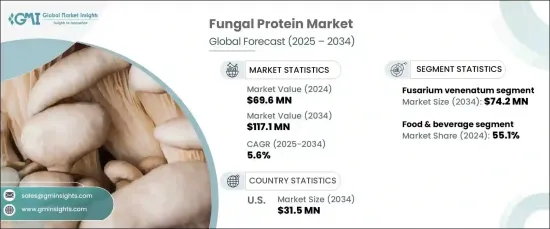
세계의 곰팡이 단백질 시장은 2024년에 6,960만 달러로 평가되었으며, 2025년부터 2034년까지 연평균 복합 성장률(CAGR) 5.6%로 성장할 것으로 예측됩니다.
이 성장의 원동력이 되고 있는 것은 효율과 제품 품질을 향상시키는 곰팡이 균주의 개발과 생산 기술의 진보입니다. 곰팡이 단백질의 영양 및 환경적 이점에 대한 소비자 의식 증가는 식품, 음식, 의약품, 사료 등 주요 산업에서의 채용을 촉진하고 있습니다. 기존의 단백질 공급원을 대체할 수 있는 지속가능한 선택으로, 곰팡이 단백질은 세계의 단백질 시장에서 중요한 역할을 하는 것으로 보입니다.

식물 유래의 친환경 단백질 솔루션에 대한 수요 증가는 주요 촉진요인입니다. 소비자는 지속 가능한 식생활의 선택을 요구하고 있으며, 이는 곰팡이 단백질 생산의 혁신을 촉진합니다. 이 변화는 환경에 대한 관심 증가와 더 건강한 라이프 스타일에 대한 관심과 일치하며, 식품 및 식품 산업이 다양한 제품에 곰팡이 단백질을 통합하도록 촉구합니다. 게다가 곰팡이 단백질의 다용도성은 의약품, 영양보조식품, 동물사료에의 응용을 가능하게 하고, 시장 기회의 확대와 산업 전체의 다양화를 지원하고 있습니다.
| 시장 범위 | |
|---|---|
| 시작 연도 | 2024 |
| 예측 연도 | 2025-2034년 |
| 시작 금액 | 6,960만 달러 |
| 예측 금액 | 1억 1,710만 달러 |
| CAGR | 5.6% |
후자리움 베네나툼(Fusarium venenatum) 분야는 2034년까지 7,420만 달러에 이를 것으로 예측되고, CAGR 5.6%로 시장을 독점할 것으로 예상됩니다. 마이코 단백질을 생산하는 능력으로 알려진이 곰팡이 균주는 높은 영양가와 지속 가능한 생산 과정에서 널리 알려져 있습니다. 대체 단백질 제품에 대한 이용이 증가하고 있는 것은 건강 지향 소비자와 환경 친화적인 수요에 부응하는 보다 깨끗한 식물 유래 솔루션으로 시장의 진화를 돋보이게 합니다.
식음료 부문은 가장 큰 점유율을 차지했으며 2024년에는 시장의 55.1%를 차지했습니다. 이 분야는 3,850만 달러로 2034년까지 연평균 복합 성장률(CAGR) 5.4%로 성장할 것으로 예측됩니다. 곰팡이 단백질은 전통적인 동물성 단백질의 대안으로 지지를 모으고 있으며, 영양 측면에서의 이점과 환경 부하 감소를 제공합니다. 보다 건강하고 지속 가능한 선택을 추구하는 소비자의 선호도에 힘입어 식물성 식품, 대체 고기, 단백질 분말 및 유제품 대체품에 널리 도입되었습니다.
미국의 곰팡이 단백질 시장은 2034년까지 CAGR 5.3%로 성장해 3,150만 달러를 달성할 것으로 예상됩니다. 건강 지향 증가와 함께 지속 가능한 대체 단백질의 채용이 증가하고 있다는 것이 수요를 견인하고 있습니다. 기술 혁신, 특히 발효 공정에서의 기술 혁신은 생산 효율성과 확장성을 향상시켜 곰팡이 단백질을 보다 저렴한 가격으로 소비자가 입수할 수 있도록 합니다.
전반적으로, 곰팡이 단백질 시장은 식생활의 선호 변화, 지속가능성의 동향, 생산기술의 진보에 견인되어 안정적인 성장을 이루려고 합니다. 소비자가 건강과 환경에 미치는 영향을 점점 더 우선시하고 있는 가운데, 곰팡이 단백질은 진화하는 세계의 단백질 사정에서 중요한 솔루션으로 떠오르고 있습니다.
The Global Fungal Protein Market was valued at USD 69.6 million in 2024 and is projected to grow at a CAGR of 5.6% from 2025 to 2034. This growth is fueled by advancements in fungal strain development and production techniques, which enhance efficiency and product quality. Increasing consumer awareness of the nutritional and environmental benefits of fungal protein is driving its adoption across key industries, including food, beverages, pharmaceuticals, and animal feed. As a sustainable alternative to conventional protein sources, fungal proteins are positioned to play a significant role in the global protein market.

Rising demand for plant-based and eco-friendly protein solutions is a major growth driver. Consumers seek sustainable dietary options, prompting innovation in fungal protein production. This shift aligns with growing environmental concerns and a focus on healthier lifestyles, encouraging the food and beverage industry to incorporate fungal proteins into various products. Furthermore, the versatility of fungal proteins allows for their application in pharmaceuticals, nutritional supplements, and animal feed, expanding market opportunities and supporting overall industry diversification.
| Market Scope | |
|---|---|
| Start Year | 2024 |
| Forecast Year | 2025-2034 |
| Start Value | $69.6 Million |
| Forecast Value | $117.1 Million |
| CAGR | 5.6% |
The fusarium venenatum segment is expected to dominate the market, reaching USD 74.2 million by 2034, with a CAGR of 5.6%. Known for its ability to produce mycoprotein, this fungal strain is widely recognized for its high nutritional value and sustainable production process. Its increasing use in alternative protein products highlights the market's evolution toward cleaner, plant-based solutions that cater to health-conscious consumers and environmentally driven demand.
The food and beverage sector accounted for the largest share, holding 55.1% of the market in 2024. Valued at USD 38.5 million, this segment is anticipated to grow at a 5.4% CAGR through 2034. Fungal proteins are gaining traction as an alternative to traditional animal-based proteins, offering nutritional benefits and reduced environmental impact. They are widely incorporated into plant-based foods, meat alternatives, protein powders, and dairy substitutes, driven by consumer preference for healthier and sustainable options.
U.S. fungal protein market is expected to achieve USD 31.5 million by 2034, growing at a CAGR of 5.3%. The increasing adoption of sustainable protein alternatives, combined with rising awareness of health-conscious eating, is driving demand. Technological innovations, particularly in fermentation processes, improve production efficiency and scalability, making fungal proteins more affordable and accessible to consumers.
Overall, the fungal protein market is poised for steady growth, driven by shifting dietary preferences, sustainability trends, and advancements in production technology. As consumers increasingly prioritize health and environmental impact, fungal proteins emerge as a key solution in the evolving global protein landscape.